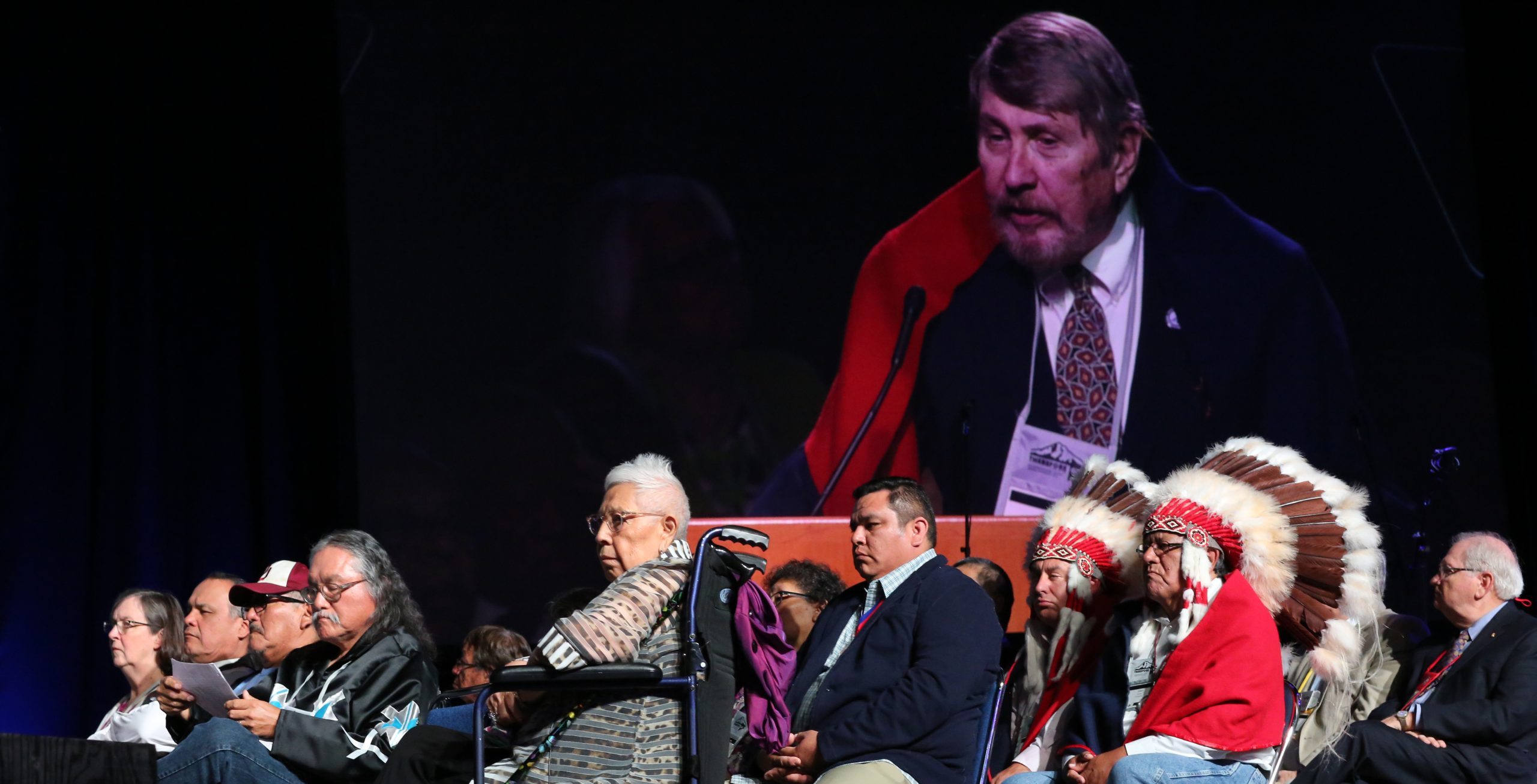
General Conference
Remember Sand Creek
On the 160th anniversary of the Sand Creek Massacre, United Methodists must remember our commitments to repent and repair
by Tara Barnes
On November 29, 1864, Methodist pastor Colonel John Milton Chivington led the brutal slaughter of more than 200 peaceful Cheyenne and Arapaho encamped at Sand Creek in Colorado Territory. This massacre, of mostly women and children, was enabled by prominent Methodist Governor John Evans. For more than a century the church failed to condemn the massacre, and these men were never held accountable. Many United Methodists do not know this history.
In 1996, the United Methodist General Conference passed the petition “Support Restitution to the Cheyenne and Arapaho Tribes of Oklahoma for the Sand Creek Massacre” and offered an apology to the Cheyenne and Arapaho peoples, doing both without fully consulting those most affected. A service of reconciliation was also cut from the proceedings.
In 2008, the General Conference committed $50,000 to a research center at the Sand Creek Massacre National Historic Site with the resolution “Sand Creek Massacre National Historic Site support.” In 2012, an act of repentance was held, and delegates passed Resolution 3324, “Trail of Repentance and Healing.” The Council of Bishops and the General Commission on Archives and History committed to providing a full disclosure of Chivington, Evans, and the church’s involvement in the tragedy. The task force commissioned historian Gary Roberts to do this work.
In May 2016, Dr. Roberts offered his report to the General Conference, the same month his book Massacre at Sand Creek: How Methodists Were Involved in an American Tragedy was published by the United Methodist Publishing House. The General Conference also passed Resolution 3328, “United Methodist Responses to Sand Creek,” in which United Women in Faith is named.
“Trail of Repentance and Healing” and “United Methodist Responses to Sand Creek” were supported by the 2024 General Conference and remain official work of The United Methodist Church.
In November 2024, to mark the 160th anniversary of the tragedy, United Women in Faith hosted a special episode of its Faith Talks podcast focused on the Sand Creek Massacre featuring Otto Braided Hair, a Northern Cheyenne descendant, and Bishop Elaine Stanovsky, who with Braided Hair co-chaired an advisory report on the Sand Creek Massacre during the 2016 United Methodist General Conference. The podcast also featured JuDee Anderson, who worked as a high school therapist on the Northern Cheyenne Reservation and whose United Methodist church in Sheridan, Wyoming, began the denomination’s relationship with the Northern Cheyenne Sand Creek descendants.
We know members of United Women in Faith are women of action, but sometimes, there are no easy answers when it comes to the work of repentance, reparation, and reconciliation.
Now is the time to listen, learn, and pray. Our work has only just begun.
The following are resources to help you learn more.
United Methodist resources
- Listen to the podcast
- Read Massacre at Sand Creek by Gary L. Roberts
- Sand Creek Massacre and Methodism video series
- “Methodists and Sand Creek” episode of the Un-Tied Methodism podcast
- Repentance and Repair: The Mountain Sky Conference Embraces Ongoing Work Surrounding the Sand Creek Massacre
- Watch the report on Sand Creek from the 2016 General Conference
- United Methodist News: “Church restarts response to Sand Creek Massacre”
- United Methodist News: “Delegates recall, lament Sand Creek Massacre”
- United Methodist News: “Spotlighting UMC’s role in indigenous boarding schools”
- 2012 UMC resolution, “1864 Sand Creek Massacre”
- 2016 UMC resolution “United Methodist Responses to the Sand Creek Massacre”
- Mountain Sky Conference: Sand Creek Healing Run
Additional resources
- Sand Creek Massacre National Historic Site
- Sand Creek Massacre National Historic Site: Stories
- Sand Creek Massacre Foundation
- History Colorado Sand Creek Massacre exhibit
- History Colorado: Oral histories of the Sand Creek Massacre
News stories:
“‘For the healing of our people’: A Sand Creek Massacre ceremonial run returns from pandemic hiatus,” by Rae Solomon for KUNC Community Radio for Northern Colorado.
“Descendants of Sand Creek Massacre survivors speak about healing 159 years later,” by Amanda Horvath for Rocky Mountain PBS.
“More than 150 years after the Sand Creek Massacre, descendants want more authority on the Colorado lands that tribes call home,” by Rachel Estabrook for Colorado Public Radio.
“Young Sand Creek and Amache descendants explore shared history,” by Rae Solomon for Rocky Mountain PBS.
Going further
United Methodist resources
- Native American Comprehensive Plan
- Native American International Caucus
- Native American International Caucus statement on Biden apology
- Native American Ministries Sunday
- Giving Our Hearts Away by Thom White Wolf Fassett
- On This Spirit Walk by Henrietta Mann and Anita Phillips
Additional resources
United Women in Faith Reading Program books: Becoming Kin, Braiding Sweetgrass, We Are Water Protectors, The Seed Keeper, Living Resistance, Notable Native People. See our Reading Program catalogs and Bookshop.org shop for more.
- Cheyenne and Arapaho tribes website
- Native American Graves and Repatriation Act
- Federal Indian Boarding School Initiative
- National Native American Boarding School Healing Coalition
Tara Barnes is director of denominational relations for United Women in Faith.
Cover photo by Kathleen Barry for United Methodist News.

